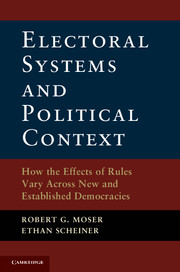 Electoral Systems and Political Context
Electoral Systems and Political Context Book contents
- Frontmatter
- Contents
- Tables and Figures
- Abbreviations
- Glossary of Key Terms
- Acknowledgments and Note on the Online Appendix
- Introduction
- 1 When Do the Effects of Electoral Systems Diverge from Our Expectations?
- 2 Mixed-Member Electoral Systems
- 3 How Democratic Experience and Party System Development Condition the Effects of Electoral Rules on Disproportionality and the Number of Parties
- 4 How Democratic Experience and Party System Development Condition the Effects of Electoral Rules on Disproportionality and the Number of Parties
- 5 Political Context, Electoral Rules, and Their Effects on Strategic and Personal Voting
- 6 How Democratic Experience and Party System Development Condition the Effect of Electoral Rules on Strategic Defection
- 7 Social Diversity, Electoral Rules, and the Number of Parties
- 8 How Political Context Shapes the Effect of Electoral Rules on Women's Representation
- 9 Conclusion
- References
- Index
3 - How Democratic Experience and Party System Development Condition the Effects of Electoral Rules on Disproportionality and the Number of Parties
Theory, Measurement, and Expectations
Published online by Cambridge University Press: 05 November 2012
- Frontmatter
- Contents
- Tables and Figures
- Abbreviations
- Glossary of Key Terms
- Acknowledgments and Note on the Online Appendix
- Introduction
- 1 When Do the Effects of Electoral Systems Diverge from Our Expectations?
- 2 Mixed-Member Electoral Systems
- 3 How Democratic Experience and Party System Development Condition the Effects of Electoral Rules on Disproportionality and the Number of Parties
- 4 How Democratic Experience and Party System Development Condition the Effects of Electoral Rules on Disproportionality and the Number of Parties
- 5 Political Context, Electoral Rules, and Their Effects on Strategic and Personal Voting
- 6 How Democratic Experience and Party System Development Condition the Effect of Electoral Rules on Strategic Defection
- 7 Social Diversity, Electoral Rules, and the Number of Parties
- 8 How Political Context Shapes the Effect of Electoral Rules on Women's Representation
- 9 Conclusion
- References
- Index
Summary
Probably the most well-known literature on electoral systems highlights how electoral rules shape the number of parties (see especially Cox 1997; Duverger 1954; Lijphart 1994; Taagepera and Shugart 1989). We, therefore, begin our analysis by exploring how different rules affect the number of parties, but we then turn to how political context – in the form of democratic experience and party institutionalization – conditions the effects of rules.
In this chapter, we lay out the concepts necessary to explore the relationship between electoral rules, context, and the number of parties. First, we discuss the principal expectations about how electoral rules affect disproportionality (i.e., the extent to which parties’ seat shares deviate from their share of the vote) and the number of parties. Second, we consider how democratic experience and party system development may condition these effects. Third, we explain how we measure the central variables – especially disproportionality, the effective number of parties, democratic experience, and party institutionalization. Finally, we discuss how specific institutional features of mixed-member systems might also shape the number of parties.
Cutting to the chase, and laying out our most important expectation, we expect restrictive electoral rules (especially FPTP) to be much less likely to constrain the number of parties in new democracies, especially those with poorly developed party systems, than in established democracies.
- Type
- Chapter
- Information
- Electoral Systems and Political ContextHow the Effects of Rules Vary Across New and Established Democracies, pp. 70 - 88Publisher: Cambridge University PressPrint publication year: 2012


